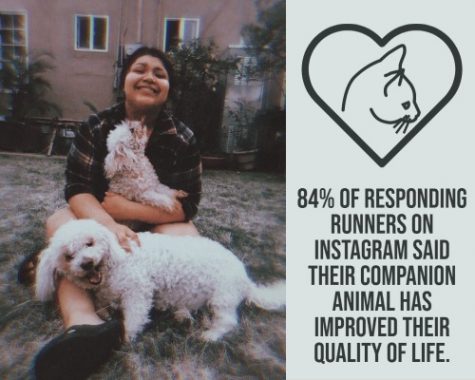Seeking comfort from furry friends
November 27, 2020
Animal companions are popular among CSU Bakersfield students but animal companions can do more than keep someone company, they can be vital to those with disabilities.
Brittany Garcia, a senior biology major, has an emotional support dog. Oliver, a 3-year-old Blue Merle Australian Shepherd, has been Garcia’s rock.
Garcia wrote in a Facebook comment that Oliver has helped her through times of depression, anxiety, and Post-Traumatic Stress Disorder.
Garcia wrote that Oliver has stood by her, and how easy it is for her to vent to him and not feel judged.
Whenever Garcia is feeling overwhelmed or overthinks, Oliver starts to whine and puts his paw on her to help her calm down.

The Americans with Disabilities Act (ADA) writes in the U.S. Department of Justice, Civil Rights Division in the Disability Section the differences between a service and emotional support animal and their requirements.
“[…] a service animal is defined as a dog that has been individually trained to do work or perform tasks for an individual with disability. The task(s) performed by the dog must be directly related to the person’s disability,” the ADA writes.
The ADA also writes that a service animal’s task can include being trained to alert a diabetic person if their blood sugar is too low, remind a person with depression to take their medication, and helping a person with epilepsy detect a seizure and make sure they are in a safe environment to have a seizure.
According to the ADA, emotional, therapy, comfort, and companion animals are not service animals because they are not trained to do a specific task or job.
“The ADA makes a distinction between psychiatric service animals and emotional support animals. If the dog has been trained to sense that an anxiety attack is about to happen and take a specific action to help avoid the attack or lessen its impact, that would qualify as a service animal. However if the dog’s mere presence provides comfort, that would not be considered a service animal under the ADA,” the ADA writes in the U.S. Department of Justice, Civil Rights Division in the Disability Rights section.
Household companion animals can help their families with their mere presence, providing a sense of comfort and understanding.
Diana Pineda, a junior sociology major, wrote in a text message to The Runner that her companion animal, Meatball, brings her comfort.
“My dog [Meatball] has helped me with not feeling alone. And has helped me from feeling really bored at times,” Diana Pineda wrote to The Runner.

However, it is important that potential adopters consider the responsibility that comes with caring for a companion animal.
Dr. Carol Raupp, a psychology professor at CSUB, reminds parents that are considering getting a furry friend for their child that the companion animal still has physical, emotional, and financial needs that need to be met.
“It shouldn’t be assumed that everybody should run out and get an animal companion, though. The physical and emotional needs of the animal companion need to be considered, along with the financial costs. A person should consider the likely path their life will take for the lifespan of the animal companion (move, housing changes, family changes) and how the companion animal’s needs will change across his/her own life,” Dr. Raupp wrote in an email to The Runner.
Raupp also wrote about the benefits an animal companion can provide their caretaker if their needs are met, such as their ability to calm their caretakers in an immediate situation, such as when the guardian pets the animals.
The complex relationship between animal and caretaker has undeniable benefits, such as how Oliver helps Brittany and Meatball helps Pineda.










Alice • Dec 15, 2020 at 2:04 am
These stories are so inspiring! Indeed, pets can provide an amazing therapeutic support, not all people are capable to do the same! The interview with Ann R. Howie about how pets can help during therapy sessions can be an addition to your article, I’ll share a link for your interest: https://certifymypet.com/blog/ann-r-howie-interview-about-how-pets-can-help-in-the-therapy-session/